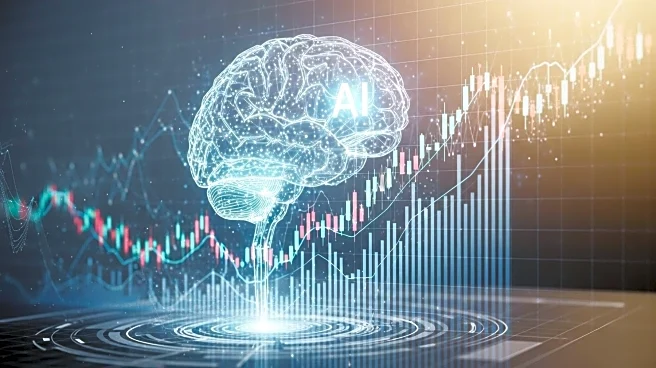What is the story about?
What's Happening?
The stock market has experienced significant gains in the third quarter, largely driven by advancements in artificial intelligence. Morningstar analysts report that AI has become a major driver of economic demand, offsetting negative macroeconomic factors such as inflation and trade tariffs. Despite strong market performance, concerns remain about the impact of tariffs on GDP growth and inflation. Morningstar predicts GDP growth to slow in the coming years, with inflation peaking in 2026. The economy is also affected by high interest rates, impacting the housing market and overall economic growth. AI investment continues to rise, while non-tech investment declines, reflecting shifts in business priorities.
Why It's Important?
The influence of AI on the stock market highlights the growing importance of technology in shaping economic trends. As AI drives investment and market gains, it underscores the potential for technological advancements to mitigate economic challenges. However, the reliance on AI raises questions about the sustainability of growth and the broader implications for industries not directly benefiting from tech investments. The disparity between tech and non-tech investment may lead to shifts in business strategies and workforce dynamics. Understanding the role of AI in economic growth is crucial for policymakers and investors navigating an uncertain economic landscape.
What's Next?
As AI continues to fuel market gains, stakeholders must consider the long-term implications for economic growth and industry dynamics. Policymakers may need to address the impact of tariffs and high interest rates on economic stability, while businesses adapt to changing investment priorities. The focus on AI could lead to increased innovation and competition in the tech sector, influencing market trends and consumer behavior. Monitoring economic indicators and market performance will be essential in assessing the sustainability of AI-driven growth and its effects on broader economic conditions.
Beyond the Headlines
The rise of AI as a key economic driver raises ethical and societal questions about the role of technology in shaping future economies. It prompts discussions on the potential for AI to exacerbate inequalities between tech and non-tech sectors, impacting employment and economic opportunities. The situation may lead to debates on regulatory frameworks and the need for policies that ensure equitable growth and access to technological advancements. Long-term implications could include shifts in industry structures and the evolution of economic models driven by AI innovation.
















